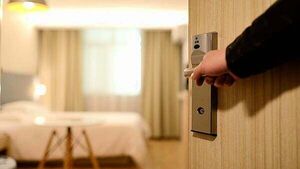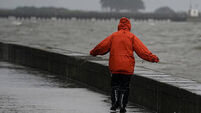Loss of tourist beds due to housing asylum seekers 'no longer critical', report says

Seán McCárthaigh
The loss of tourist beds due to the need to house international protection applicants and refugees from Ukraine is “no longer critical,” according to new research by Fáilte Ireland.
New figures show that more than 8,000 extra beds are believed to have come available again as tourist accommodation in the past six months, as the number used to house asylum seekers and refugees has decreased by 12 per cent over the same period.
The research revealed that the number of beds under State contract has now fallen to 5.7 per cent of all tourist accommodation registered with Fáilte Ireland across the country – down from 12 per cent two years ago.
A report by Fáilte Ireland shows a total of 57,410 beds were occupied in May 2024 under contracts with the Government for housing refugees and asylum seekers – a decrease of 8,047 since November 2024.
It shows a continuing downward trend in the need to use tourist accommodation to house non-tourists with the number of beds registered with Fáilte Ireland in use for housing asylum seekers and Ukrainian refugees down 26 per cent in the past year.
“The impact on most destinations has reduced significantly and, in national terms, is no longer critical,” the report stated.
The latest figures, which are based on data from the Department of Justice, show 14,010 asylum seekers and refugees were housed in Fáilte Ireland registered properties last month – an annual decrease of 44 per cent.
A further 43,400 were living in non-Fáilte Ireland registered facilities but which would have been providing accommodation for the tourism sector – a decrease of 17 per cent in the past year.
Fáilte Ireland acknowledged that the figure of just under 6 per cent of all registered tourist beds being under State contract might understate the real impact of contracted beds on the availability of tourist accommodation.
It pointed out that for every registered bed under contract there was one or more beds contracted in unregistered tourism relevant sites.
The latest figures also highlight that there are four countries where the registered bed stock unavailable for tourist accommodation remains in excess of 10 per cent.
They are Wicklow (14 per cent); Clare (12 per cent); Meath (12 per cent) and Louth (10 per cent).
The rate in other popular tourist destinations is varied including Cork (9 per cent), Mayo (7 per cent), Dublin (6 per cent), Kerry (5 per cent) and Galway (3 per cent).
At one stage, 33 per cent of all Failte Ireland registered properties in Clare were being used to house asylum seekers and refugees.
However, the figure is now below 5 per cent in a majority of the 26 counties, while no Fáilte Ireland registered accommodation providers are under contract in Laois, Longford and Roscommon.
“For most counties, the impact on destinations has reduced significantly and is no longer at critical level,” the report stated.
However, Fáilte Ireland acknowledged that some areas were still challenged in terms of providing tourist accommodation in the peak season.
Last November, Fáilte Ireland estimated that the economic impact of the displaced bed stock on the tourism industry was between €400 million and €670 million.
It had expressed concern that the unavailability of some tourism accommodation was limiting the industry’s ability to meet demand from domestic and overseas tourists, while also leading to higher prices due to a “supply-demand imbalance.”
Fáilte Ireland said the issue highlighted again the importance of having a fully inclusive register of tourist accommodation.
A proposed Short-Term Tourist Letting Bill by the Government is due to require properties for short-term tourist lettings that are advertised on platforms like Airbnb to be registered with Fáilte Ireland.
Such platforms will also be obliged to only advertise properties which have a valid registration number from Fáilte Ireland.




